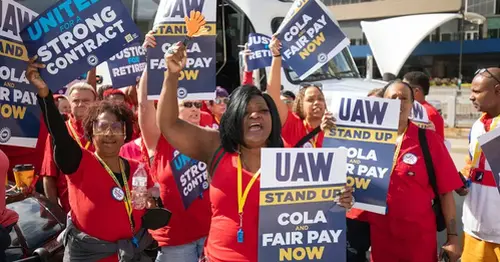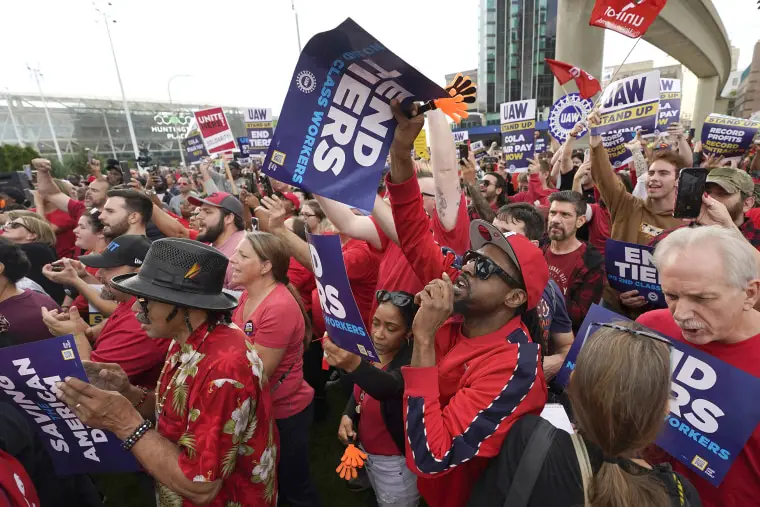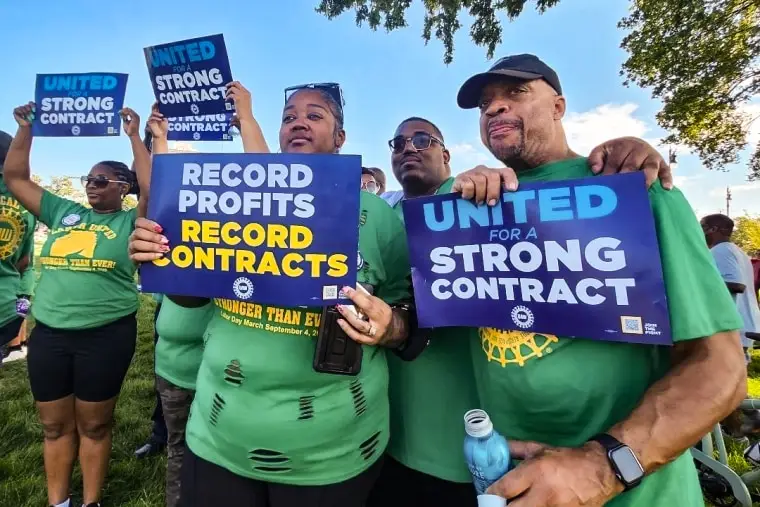
Black UAW workers say they're striking to keep the promise of a middle-class life
When Tiffanie Simmons joined her father for Bring Your Daughter to Work Day, she left knowing that one day she’d return to the Ford Michigan Assembly Plant as an employee.
She was 12.
Sure, the self-proclaimed “Daddy’s girl” wanted to follow in her father’s footsteps, but more crucially, she understood that her family lived a comfortable middle-class life as a Black family in Detroit.
“My father supported an entire household with one paycheck,” she said.
In 2012, after toiling part time for five years, Simmons, now 38, joined the same Ford Michigan Assembly Plant as her dad, fulfilling a long-standing dream.
But things are not as she had hoped. Her plant, in Wayne, was one of the first three United Auto Workers sites to go on strike last week, along with the General Motors plant in Wentzille, Missouri, and the Stellantis Toledo assembly plant in Ohio. On Friday morning, UAW President Shawn Fain called for walkouts at 38 additional General Motors and Stellanis plants across 20 states.
And as prospects loom that the walkout could last a while, concern grows for Simmons and other Black UAW members that the middle-class life they came to appreciate as children and expected as adults is threatened.
The Simmons family resided in a home they owned. Both of her parents had cars. She recalls she and her three brothers did not want for much.
“I’ve been a Ford girl my entire life. I basically grew up in a plant,” she said. “Ford has paid for college, paid for braces for me and much more.”

Simmons, who is a production team leader at the plant and member of UAW Local 900 now has her own child.
“It’s very sad that now that it’s my daughter’s turn to be a Ford baby, her mama has to stand up and fight because they are not giving Mama the same thing they did her poppa.”
After World War II ended in the 1940s, Black Americans found stable work and fairer wages making cars. Auto industry jobs were unionized and paid well, allowing Black autoworkers to form a Black labor “aristocracy,” according to a 2010 paper by Thomas J. Sugrue, a professor of history and sociology at the University of Pennsylvania. Work in auto plants provided an advancement for Black people who had been disproportionately restricted to such jobs as domestics, chauffeurs, custodians and farm laborers, according to Sugrue's report.
Simmons’ three younger brothers were all recently hired at Ford. All four seek a pathway to financial stability in the same workplace where their father, on the cusp of retirement, flourished.
But she and one of her brothers are on the picket lines. Her dad and two other brothers are working — for now.
“Everybody is in the fight and have their shoes on, ready to walk whenever the time comes,” Simmons said. “That’s the important part. It’s not that we’re the only ones that’s doing the fighting. We just had to be the first on the front line.”
The battle is for better wages, wages that the strikers say have not kept up with the times. The union wants a 36% salary increase. It is also asking for a restoration of cost-of-living pay raises, an end to fluctuating tiers of wages for factory jobs, a 32-hour workweek with 40 hours of pay, the return of defined-benefit pensions for new hires, who now receive only retirement plans similar to 401(ks), pension increases for retirees and other concerns.
On the crucial issue of wages, the automakers have countered with a wage offer that is about 50% of the UAW’s demands.
“Detroit is a predominantly African American city,” Simmons said, “where if you didn’t know what you wanted to do in life, you knew you could go get you a job. You could build some cars and you could make a damn good living and a very comfortable life for yourself and your family. That’s all we want.”

Lynda Jackson, who works for Stellantis and is the recording secretary for UAW Local 7 in Detroit, shared similar beliefs. Her father moved from Birmingham, Alabama, in 1968 to work at Chrysler (now under parent company Stellantis) after his two brothers secured jobs there. Her mother worked there too.
“Everybody on our block worked for the big three auto companies,” Jackson said. “Growing up, I didn’t know the difference between classes. I just knew I didn’t want for anything. We went on a family vacation every couple of months. Our house was paid for. My parents had cars and my stepmother leased a car every couple of years. I just thought we were living the dream.”
“For Black people, who have been held back in society, building cars was a way to have a great life.”
She expected the same for herself when she began at Chrysler in 2010. But, Jackson, 36, said, “My wage difference is only $3 from my mother’s when she retired 19 years ago. But the vehicle price has gone up almost $30,000 in the 13 years I’ve been employed with Chrysler.”
Jackson’s plant has not yet been called on to strike. Despite the union’s $825 million fund to aid workers during the strike, she said leaving the factory would be “devastating,” because her husband also works at the plant.
“This strike is really saying that the workforce is kind of fed up,” she said. “We support this effort. But it’s important because my whole household will take a devastating hit if my location is called to stand up a strike. But then it’s like: How long could we afford to be off work?”
She cited South Carolina Sen. Tim Scott, a Black Republican candidate running for president, who, on the campaign trail, said he agreed with former president Ronald Reagan, who said, “If you strike, you get fired,” upon terminating more than 11,000 air traffic control workers in 1981.
“I feel like this fight is for the middle class and people don’t realize it,” Jackson said. “The American consumer thinks that if we make more money, we’re going to make the price of the vehicle go up. And that’s the narrative the company likes to throw out there so that American citizens will turn their backs on us.”
While Detroit is Motor City, Jonathan Ellis of UAW 862 in Louisville, Kentucky, said the impact of carmaking in his town is just as significant.
“The auto industry has provided wealth and opportunities here, too,” he said. “It’s been our history and we want to keep it going. A lot of Black people, Black middle-class people, rely on this work for a good living. That’s why we’re striking and why we’re in solidarity.”
The union had agreed to pause some benefits amid the 2008 car manufacturer bailout, in which Chrysler, Ford and GM were issued billions of dollars from the federal government to staunch potential shutdowns and bankruptcy. Jackson said she hopes that undergoing these “past sacrifices” will be a positive factor in the sides coming to an agreement.






